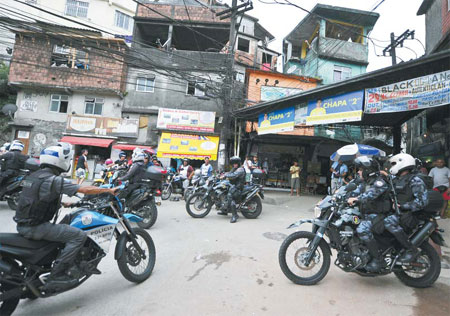Mail arrives in Rio 'drug favela'
Updated: 2011-12-29 08:00
By Claire de Oliveira (China Daily)
|
|||||||||
|
Paramilitary police personnel with motorcycles stand guard on a street at Rocinha shantytown on Dec 14 in Rio de Janeiro, Brazil. After the pacification of the shantytown, retaken from drug traffickers' gangs barely one month ago, Rio's municipality has begun regularizing the neighborhood, naming the streets and numbering the buildings, allowing its inhabitants to be reached by the post. [Christophe Simon / Agence France-Presse] |
Normality starts to return to area after cleanup
RIO DE JANEIRO - Tomazia Ferreira Martins has been living for 40 years at the same house in the hillside Rio shantytown of Rocinha - but as long as drug gangs ruled the neighborhood, she never got mail delivered at home.
Now that the government has flooded the area with police and soldiers and "pacified" her slum, letter carriers are delivering the mail in vans, and will soon deliver to each home.
Soldiers and police, backed by armored vehicles and helicopters, stormed Rocinha and two other shantytowns - known here as "favelas" - in mid-November.
The operation widened the security perimeter around Rio's residential and tourist area as Brazil prepares to host soccer's 2014 World Cup and the 2016 Summer Olympics.
Ferreira Martins, 72, showed great mistrust when she opened her door to Alejandro Furlanatto, an engineer with the Rio city government. Furlanatto was with a team mapping Rocinha, which overlooks Rio's wealthiest neighborhoods.
"The goal is to map out the place, give the streets names, and number the homes. Then it will be up to the post office to give residents a postal code," Furlanatto said. Once that is complete, then they can get home mail delivery.
More than 1.5 million people, a third of Rio's population, live in some 1,000 slums perched on steep hillsides across the city. The areas have not been properly surveyed and appear as blank spaces on city maps.
Ferreira Martins answers questions from Furlanatto and his team, and is more relaxed by the end of the visit. Her three-floor brick home has finally been legalized. She has to meet municipal health and safety standards, and eventually she will get something millions take for granted: mail at home.
The challenge for the authorities after the massive security operation is to provide basic services like water, sanitation and lighting - and mail - in this labyrinth-like mini-city built on a hillside.
"Rocinha is a city that grew in an unplanned manner, on a steep slope and with few access roads for trucks and equipment," Carlos Roberto Osorio, the city secretary for public utilities, told the daily O Globo in November.
Pickup driver Jose Maria, 30, said that only the favela's lower streets have names and numbers - only 20 percent of Rocinha, according to the mayor's office.
"Beyond the open sewer, where access is difficult, there is nothing," he said. "The postal workers drop the mail in boxes set up in bars or shops below the favela. It's up to area residents to pick them up."
Sure enough, a bar owner named Valdir shows off a wooden box. "Most of the people here give my address, and then come to pick up their mail here," he said.
Between now and April each street in Rocinha should have a name and each building should have a number, according to the city plans, though it will take much longer to inspect the favela's 25,000 homes.
The job of incorporating favela residents into the legal Brazilian society "involves a lot of education", said Lesli Figueiredo, who manages several positions in the newly "pacified" favelas.
"People must understand that there is a law - which is no longer that of the drug traffickers - and that they have rights, but also obligations," Figueiredo said.
Two yellow post office trucks now drive around the favela so residents can get their mail delivered closer to their home.
Drug dealing and traffickers may steadily be swept aside. But even the legal, more peaceful Rocinha has downsides: Last week for the first time ever, a neighborhood store selling household appliances was held up by a gang of gunmen, unthinkable when drug lords, and fear of them, ruled the streets.
Agence France-Presse











